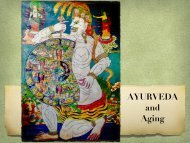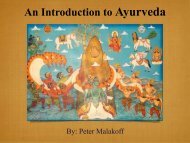How Thoreau's Walden Pond Mixed with the Ganges and Yoga Came to America with Swami Vivekananda
One early morning in 1846, during the coldest days of a New England winter, Henry David Thoreau looked out the window of his small cabin on Walden Pond and saw men cutting its ice into blocks. That ice was hauled by horse to a railroad that ran across the western edge of Walden Pond, packed into a boxcar, taken to Boston and loaded onto a clipper ship that sailed to Calcutta, India, arriving about four months later. Once there, that ice was purchased by grateful members of the East India Company. Thoreau had witnessed a small part of the global ice trade between New England and India that took place during the latter part of the nineteenth century. When Thoreau considered the ice trade, his vision sailed on metaphors far beyond the scope of business. The waters he imagined flowed both east and west and carried not just natural elements, but culture, religion and philosophy as well. He envisioned that after arriving in Calcutta, the New England ice of Walden Pond would eventually melt and run downhill where it would join with the sacred water of the Ganges. He wrote in Walden: "It appears that the sweltering inhabitants of Charleston and New Orleans, of Madras and Bombay and , drink at my well. In the morning I bathe my intellect in the stupendous and cosmogonal philosophy of the , since whose composition years of the gods have elapsed, and in comparison with which our modern world and its literature seem puny and trivial; and I doubt if that philosophy is not to be referred to a previous state of existence, so remote is its sublimity from our conceptions. I lay down the book [Bhagavad-Gita] and go to my well for water, and lo! there I meet the servant of the Bramin, priest of and and who still sits in his temple on the Ganges reading the , or dwells at the root of a tree with his crust and water jug. I meet his servant come to draw water for his master, and our buckets as it were grate together in the same well. The pure Walden water is mingled with the sacred water of the Ganges." This book tells the story of these waters . . .
One early morning in 1846, during the coldest days of a New England winter, Henry David Thoreau looked out the window of his small cabin on Walden Pond and saw men cutting its ice into blocks. That ice was hauled by horse to a railroad that ran across the western edge of Walden Pond, packed into a boxcar, taken to Boston and loaded onto a clipper ship that sailed to Calcutta, India, arriving about four months later. Once there, that ice was purchased by grateful members of the East India Company. Thoreau had witnessed a small part of the global ice trade between New England and India that took place during the latter part of the nineteenth century.
When Thoreau considered the ice trade, his vision sailed on metaphors far beyond the scope of business. The waters he imagined flowed both east and west and carried not just natural elements, but culture, religion and philosophy as well. He envisioned that after arriving in Calcutta, the New England ice of Walden Pond would eventually melt and run downhill where it would join with the sacred water of the Ganges. He wrote in Walden: "It appears that the sweltering inhabitants of Charleston and New Orleans, of Madras and Bombay and , drink at my well. In the morning I bathe my intellect in the stupendous and cosmogonal philosophy of the , since whose composition years of the gods have elapsed, and in comparison with which our modern world and its literature seem puny and trivial; and I doubt if that philosophy is not to be referred to a previous state of existence, so remote is its sublimity from our conceptions.
I lay down the book [Bhagavad-Gita] and go to my well for water, and lo! there I meet the servant of the Bramin, priest of and and who still sits in his temple on the Ganges reading the , or dwells at the root of a tree with his crust and water jug. I meet his servant come to draw water for his master, and our buckets as it were grate together in the same well. The pure Walden water is mingled with the sacred water of the Ganges."
This book tells the story of these waters . . .
You also want an ePaper? Increase the reach of your titles
YUMPU automatically turns print PDFs into web optimized ePapers that Google loves.
aspect of God. They are buildings for <strong>the</strong> focus for individual sacrifice, surrender<br />
<strong>and</strong> overwhelming gratitude.<br />
Village India worships a different God than that of <strong>the</strong> modern world. I do not<br />
mean Krishna or Kali instead of Jesus, but <strong>the</strong> mystery of God <strong>with</strong> millions of<br />
faces, formless <strong>and</strong> <strong>with</strong> form; who is one God, many Gods <strong>and</strong> only God . . . a<br />
superior power <strong>and</strong> intelligence that must be taken in<strong>to</strong> account, infinitely greater<br />
than our comprehension, who is worshipped, idolized, feared <strong>and</strong> adored <strong>and</strong><br />
ultimately not o<strong>the</strong>r than what is.<br />
In Delhi, Calcutta, Mumbai or Bangalore, such underst<strong>and</strong>ing is no longer<br />
true in <strong>the</strong> first few years of <strong>the</strong> 21 st century, as all over India a flood-tide of<br />
westernization grows higher <strong>and</strong> buildings that embody <strong>the</strong> new ideals of<br />
business <strong>and</strong> finance are rising quickly.<br />
India is <strong>the</strong> origin of <strong>the</strong> world's oldest civilization, <strong>the</strong> flowering tree at <strong>the</strong><br />
heart of <strong>the</strong> world. Although many of its branches have been removed, <strong>the</strong><br />
roots are still here, even though modern India is digging <strong>the</strong>m out as quickly<br />
as it can <strong>with</strong> both h<strong>and</strong>s, passionately trying <strong>to</strong> copy <strong>the</strong> West. This culture<br />
has <strong>with</strong>s<strong>to</strong>od <strong>the</strong> Moguls, <strong>the</strong> Portuguese, <strong>the</strong> French <strong>and</strong> <strong>the</strong> English, <strong>and</strong> its<br />
walls have never been breached. But now something has changed . . . <strong>the</strong><br />
Trojan horse of technology has been hauled <strong>with</strong>in <strong>the</strong> walls of nearly every<br />
Indian household <strong>and</strong> <strong>the</strong> westernizing mind <strong>and</strong> values inside it are<br />
destroying <strong>the</strong> age-old traditions that protected this culture for thous<strong>and</strong>s of<br />
years.<br />
India is so old that we are like young children, dismissing our gr<strong>and</strong>parents<br />
as out of <strong>to</strong>uch, when in fact, it is we (like <strong>the</strong> frog in <strong>the</strong> well that<br />
Vivekan<strong>and</strong>a referred <strong>to</strong>) who have never seen <strong>the</strong> ocean, who are immature,<br />
limited <strong>and</strong> have little idea of <strong>the</strong> insufficiency of our experience or what is<br />
even possible.<br />
Something extraordinary once flourished here. It still does – it is merely<br />
sleeping in <strong>the</strong> winter of a world increasingly ruled by <strong>the</strong> concerns of<br />
business <strong>and</strong> money. The voice of true religion has fallen more quiet, but it is<br />
97


















